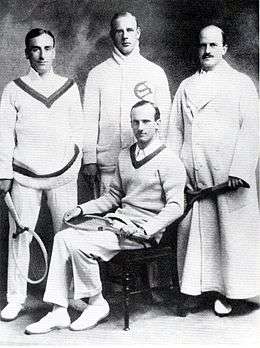J. F. Foulkes
John Fortescue 'J.F.' Foulkes DSO (10 July 1872 – 22 June 1948), also known as Captain Foulkes, was an early star of Canadian tennis. Foulkes may have been a three-time winner of the Canadian national championship, today known as the Rogers Cup. He was also a member of the only Canadian team to reach the finals of the Davis Cup.[1]
 Canada's 1913 Davis Cup team; J. F. Foulkes is at the right. | |
| Full name | John Fortescue Foulkes |
|---|---|
| Country (sports) | |
| Born | 10 July 1872 Middlesex (now London), England |
| Died | 22 June 1948 (aged 75) Canada |
| Singles | |
| Grand Slam Singles results | |
| Wimbledon | 3R (1908) |
| Other tournaments | |
| Olympic Games | 3R (1908) |
| Team competitions | |
| Davis Cup | F (1913) |
Early life and family
Foulkes was born in Middlesex, England, the second of six children born to Rev. Augustine Lempriere Foulkes and Francesca Forster (née Godfrey). His father, who had been a cricket player, earned a doctorate at Queen's College, Oxford and was the vicar of Steventon.[2] He had three brothers (Godfrey, Louis and Leonard) and two sisters (Francesca and Catherine).
Tennis career
He moved to Canada as a teenager in 1891, and quickly began winning tournaments. A member of the Victoria Lawn Tennis Club, Foulkes may have captured the Canadian national championship in singles 1907, 1909, and 1910 - at least one source says otherwise however.[3] His 1907 win, if it did occur, broke a string of 13 consecutive wins by an American player and only the second for a Canadian in 18 years. The source that disputes that Foulkes won his titles claims he was, instead, runner-up in 1907 and again in 1908.
He competed in the men's singles and doubles events at the 1908 Summer Olympics.[4]
Foulkes along with fellow Victoria natives B. P. Schwengers, R. B. Powell and Victoria-based Henry Mayes reached the final of the 1913 Davis Cup in the country's first attempt. (All four players were members of the Victoria LTC.[5]) With the entire tournament played at Wimbledon in June–July, the upstart Canadians, with Powell and Schwengers playing each match, beat South Africa, 4 wins to 1 and then Belgium, 4-0, to reach the final. In the final, however, they were overwhelmed by the Americans losing each set of three matches they contested.
Foulkes was also a British Columbia, five-time Pacific Northwest champion, and two-time Washington State champion. He was ranked No. 1 singles in the USTA Pacific Northwest in 1914.[6]
Foulkes has been elected to both the Greater Victoria Sports Hall of Fame as a member of the 1913 Davis Cup team. He was also elected to USTA Pacific Northwest Tennis Hall of Fame in 2008.[1][7]
Captain Foulkes
Foulkes served in the Canadian Army during the Boer War, earning the Queen's Medal with four clasps. From then on he was frequently referred to as "Captain" Foulkes.[8][9][10] He served again during the First World War in the 4th Canadian Division in the Canadian Service Corps.[1] He was awarded the Order of Agricultural Merit from France and was mentioned in despatches three times in 1917 and 1918.[11] In the 1919 New Year Honours following the war, he was awarded the Distinguished Service Order.[12]
References
- "John Fortescue Foulkes". Tennis Archives.
- Holland, Arthur William (1904). Oxford & Cambridge Yearbook. S. Sonnenschein & Company, Limited. p. 216. Retrieved 19 June 2017.
- "Archived copy". Archived from the original on 17 July 2011. Retrieved 26 September 2009.CS1 maint: archived copy as title (link)
- "J. F. Foulkes Olympic Results". sports-reference.com. Archived from the original on 2 February 2014. Retrieved 31 January 2014.
- "Archived copy". Archived from the original on 22 January 2010. Retrieved 17 August 2010.CS1 maint: archived copy as title (link)
- Hall-of-Fame-and-Historical - | USTA Pacific Northwest
- "USTA PNW Hall of Fame Inductees". USTA. 17 May 2017.
- Lefroy, W. (1908). Canada: An Illustrated Weekly Journal for All Interested in the Dominion. p. 5. Retrieved 19 June 2017.
- Wright & Ditson's Lawn Tennis Guide. 1914. p. 190. Retrieved 19 June 2017.
- Wright & Ditson Officially Adopted Lawn Tennis Guide. Wright & Ditson. 1911. p. 179. Retrieved 19 June 2017.
- Quarterly Army List for the Quarter Ending 31st December, 1919 - Volume 4. Andrews UK Limited. 2012. p. 1960. ISBN 9781781502990. Retrieved 19 June 2017.
- "No. 31092". The London Gazette (Supplement). 31 December 1918. p. 21.